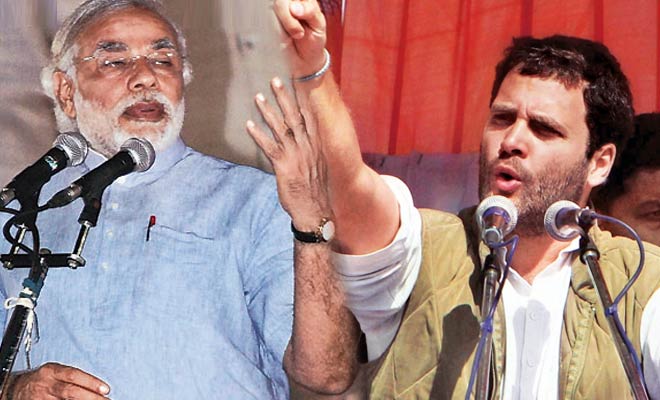New Delhi: As election verdicts go, the Gujarat assembly election has thrown up an all-too-rare one: both the winner and the loser are likely to be happy with it. Better still, it could encourage all parties to pay serious attention to unemployment and farm distress, not just in Gujarat, but across the country. The Bharatiya Janata Party won the close election fair and square, earning the right to govern the state in which it has been in power for 22 years, for five more years. It won 99 seats in the 182-member assembly to the Indian National Congress’ 77. That number was short of the 115 seats it won in the 2012 assembly elections. It was also, for the record, way short of the target of 150 the BJP and its president Amit Shah had set ahead of the elections. Still, the BJP has reason to be happy (although it might have been happier had it at least matched its 2012 tally or crossed the psychologically significant 100 mark). It won the state. Even better from its perspective, it increased its vote share marginally to 49%. And it managed to retain its sway over urban areas in the state, winning 46 of the 56 seats, and 57.8percent of the votes. In 2012, it won 50 of these seats. In some ways, its continued good performance in urban areas is a vindication of the Gujarat model. There are more reasons for the BJP to be happy. It appears to have minimized the impact of the Patidar agitation and the subsequent partnership between the Patidar Anamat Andolan Samiti (PAAS), led by Hardik Patel, and the Congress. Neither demonetization nor the Goods and Services Tax – the second attracted the ire of small businessmen in Gujarat’s business belt – affected its prospects in urban areas. Indeed, in the Surat region, which had seen intense protests over GST, the BJP won 15 of 16 seats, the same number it did in 2012, although at least some of this can be attributed to the changes it made in the GST regime. Finally, and perhaps most importantly, its win, despite many factors that pointed to an uncomfortably close contest ahead of the election, is a victory for Narendra Modi, the face of the BJP campaign. Indeed, the Prime Minister seemed to hit his stride, and find the correct pitch, between the first phase and the second, and the BJP definitely did better in the second phase when compared to the first. The Congress may have lost the election in Gujarat, but it won 77 seats, 16 more than the 61 it won in 2012 (that number was reduced even further by early 2017, thanks to desertions). Since 2014, when it was reduced to an insignificant minority in Parliament, and barring the Punjab assembly election earlier this year, which it won, the party hadn’t got much right when it comes to elections – till Gujarat 2017. Its partnerships hadn’t worked, its star campaigner, Rahul Gandhi, had not made much of an impact (indeed, in Punjab, the campaign was led by Amarinder Singh), and when it did manage to be in a position to form the government, a strange sort of inertia seemed to settle over it – allowing the BJP to steal a march as it did in Goa and Manipur earlier this year. Gujarat 2017 was different. Part of the BJP’s traditional electoral base, the Patidars who have been seeking reservation, Dalits catalysed into action by the attack at Una, and small businessmen hurt by demonetization and GST, were angry. There was significant agrarian distress. It was an opportunity for the Congress. The recent history of the Congress is replete with instances of such missed opportunities. This time, the Congress didn’t miss it. The party forged an alliance with PAAS, other backward classes, and Dalits. A re-energized Rahul Gandhi hit the campaign trail. He even visited temples because it was important that he be seen doing so in a predominantly Hindu state. Gujarat was never going to go to the Congress. Not in 2017. But the party did as well as it could have. If both the BJP and the Congress are winners, then so are voters across India. The BJP, and, for that matter, any party in power, is now unlikely to take voters for granted. The BJP’s performance is a clear indication of the unhappiness of farmers and farm workers (on account of the agrarian crisis), and young people (on account of unemployment). The two could become significant issues in elections in some large states, including Rajasthan and Madhya Pradesh, next year. It would be against character for the BJP, usually quick to pick voter sentiment, to not do anything about this. And so, the people of Gujarat, while backing the party they have backed for the past 22 years, may well have sent a message and a warning to political parties across India.
Don’t take voters for granted, Gujarat election results are a sign of things to come
- by Rinku
- December 19, 2017 2 minutes

Modi Rahul-2











